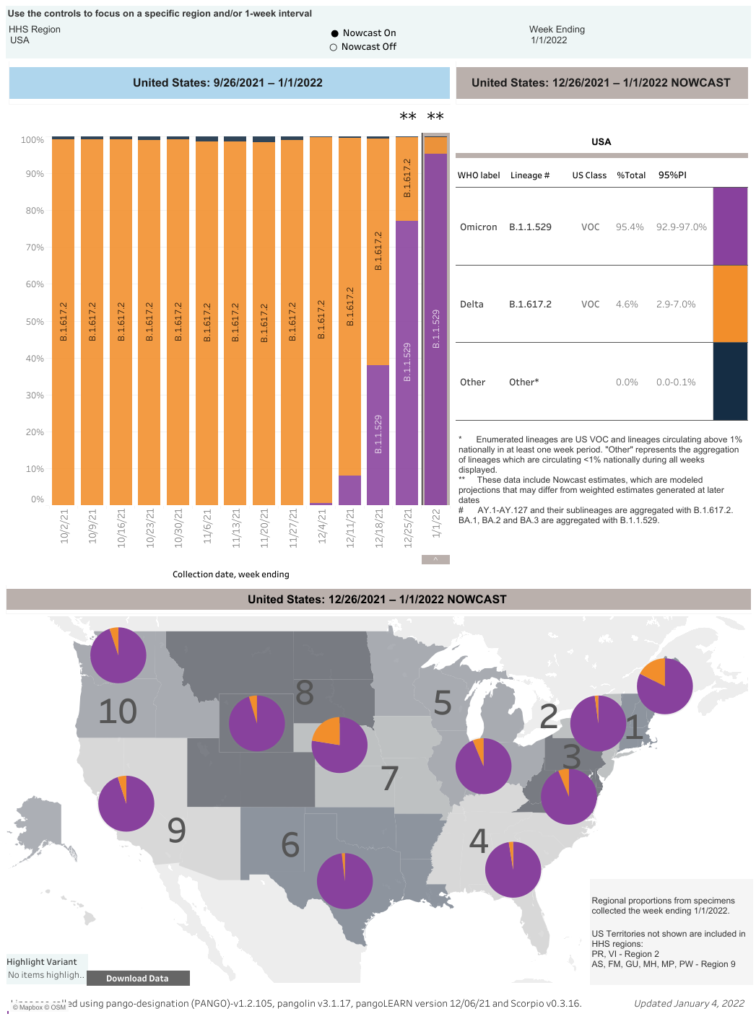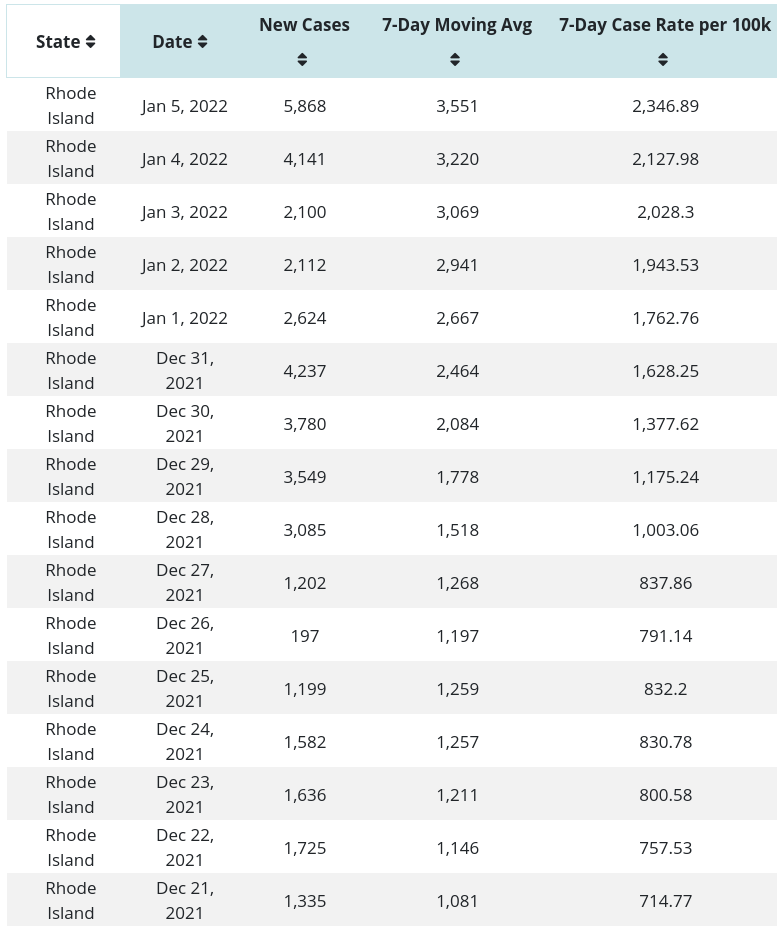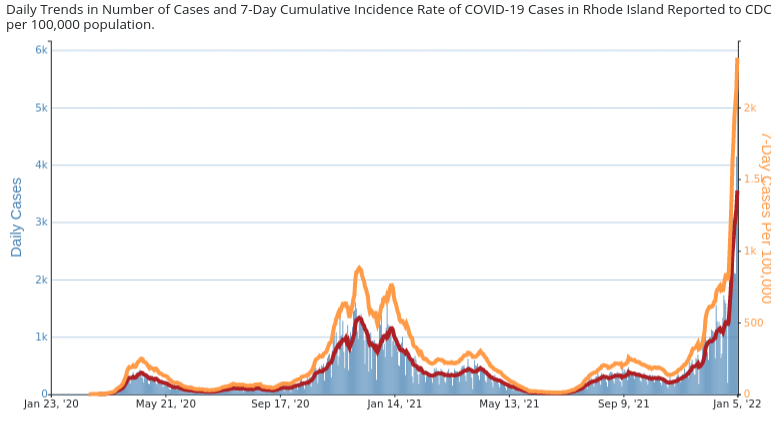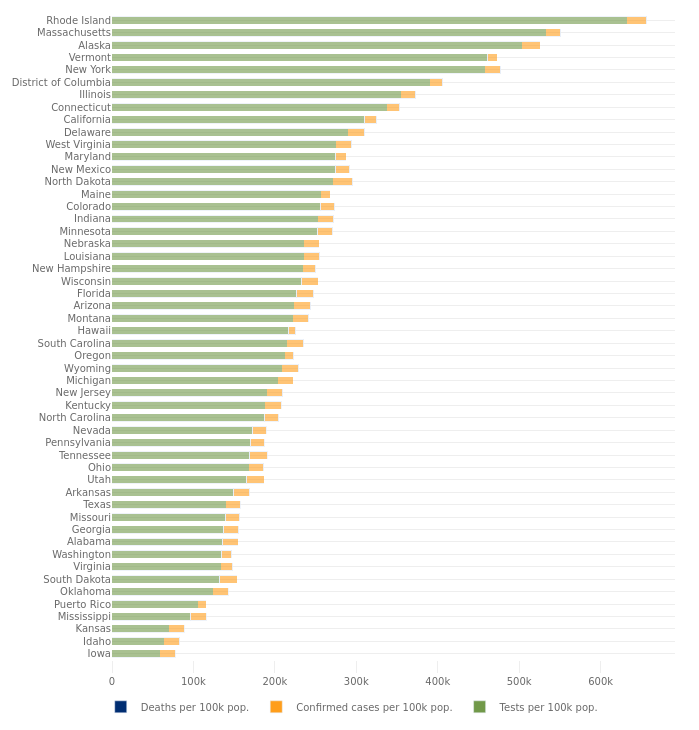At time of writing, RI is in bad shape for COVID-19, with a surge of cases unprecedented over the course of the entire pandemic. RI is weeks behind where it could have been if it had taken into account clear warning signs.
At a Woonsocket press conference with Gov. Daniel McKee and others on Dec 30, Department of Health (RIDOH) Director Nicole Alexander-Scott offered a blunt assessment of the situation: “I want to share what we are expecting January to look like. It indeed is going to be a difficult month from a COVID standpoint. It’s not only here in RI, it’s regionally and it’s nationally.

“We’re in an unprecedented moment within an unprecedented two-years-plus period of time. The shift indoors with the colder weather, the heightened transmissibility of the Omicron variant that’s double what we were already seeing is occurring with the Delta variant, the holiday gatherings, and the general increased levels of social interaction all mean that we could sustain case numbers through the middle or end of January that will well exceed the peak we have ever experienced throughout this entire pandemic.”
She continued, “This week, we have already had three days with more than 3,000 cases each day. And we believe that what we’re seeing now is still predominantly Delta variant of COVID. Our rough estimate is that only approximately 10% or so of infections in Rhode Island right now are Omicron variant cases.”
One week later, on Jan 5, RIDOH spokesman Joseph Wendelken told Motif, “The proportion of our infections that are Omicron is now likely close to 45%. This is a rough estimate.”
It was widely misreported in the press that the US Centers for Disease Control and Prevention (CDC) estimated that 73.2% of US cases were the Omicron variant as of Dec 18, but this was not any kind of direct measurement but just a projection from a mathematical model whose boundary condition assumptions had been exceeded, and the estimate was later revised down to 22.5%. For samples collected the week of Dec 26 to Jan 1, the CDC estimates 95.4% were Omicron, but that it has been somewhat slower to spread in the Northeast with only 82.4% of cases in that same week.

After a prior gubernatorial press conference on Dec 15 at the State House, Alexander-Scott told Motif in a private interview that indications suggested the Omicron variant was two to three times more transmissible than the Delta variant. That early expectation has been generally confirmed since.

However, Gov. McKee said he didn’t see signs of a surge before Thanksgiving. In response to a question at the Dec 30 press conference from Boston Globe reporter Brian Amaral about why the state was, only a few weeks ago, talking about closing rather than opening testing and vaccination sites, McKee defended the timeline of his administration’s response to the surge, claiming that it took them by surprise. “I think that we always tend to look in the rearview mirror on things. Perhaps if you had a crystal ball, you could have done that. But remember, we didn’t: Until coming up to Thanksgiving [Nov 25], this issue was not on the table. Infection rates increased on Dec 4, and then did again on Dec 11 weekend, and Dec 18.”
I pushed back at that press conference: “Governor, I respectfully would not characterize the data that way. It looks to me that we’ve been seeing a significant increase just on the state’s own data… getting back to about the middle to the end of October. I specifically remember asking that question at a press conference at around that point.”
McKee responded, “I’ll look at those numbers again out of respect to the question, but I don’t believe that’s accurate. …When we get back together again, if I’m wrong I’ll certainly admit that.”
Amaral reported in the Boston Globe on Jan 4, 2022, that he had obtained a copy of the “State of the Spread” dated Nov 16, 2021, a regular internal report circulated to state leaders, that showed an alarming increase in cases and predicted a surge in a matter of weeks.
The date of that report was the same day as another gubernatorial press conference where I directly raised the spiking case loads with Alexander-Scott and McKee after they emphasized percent positivity from testing, and I cited specific RIDOH data trends indicating that the RI seven-day moving average was then up around 240 daily cases per 100,000 population, up from 130 in October and 10 to 20 times higher than June and July.

Alexander-Scott responded, “It’s a true reflection on the Delta strain that we have been talking about. The Delta variant is significantly more contagious than earlier versions of COVID-19. It’s why we need vaccination, testing, masking, distancing, ventilation, all of the tools fully activated.
“It is possible to get us through what we are anticipating as the winter is approaching. People are going indoors, it’s colder outside. … Rhode Island is a population that is more densely populated. We have seen throughout the pandemic that our numbers in terms of cases per 100,000 are higher in general, connected to some of those demographic factors, which is why we balance it with percent positivity, but all of it is going in the direction that is anticipated. We hoped not but we knew we would be ready. We’re well vaccinated. We’re still seeing cases that are higher among those who are not vaccinated. So that’s true evidence and indication of how important it is to get vaccinated. And then making sure all of the other mitigation steps that we’re talking about are followed as a critical approach.”
According to CDC data, the seven-day moving average of daily cases per 100,000 population in RI was 143.95 on Oct 31, 256.19 on Nov 16, 727.51 on Dec 15, 1,377.62 on Dec 30, and 2,346.89 on Jan 5; by contrast on Jul 1, that number was 10.48. Almost all of this surge was the Delta variant, as the Omicron variant was only assigned a Greek letter in late November and the first case in RI was announced only in mid-December (“Omicron in RI: First patient identified”, by Michael Bilow, Dec 11, 2021).
Of course, the official numbers generally do not reflect at-home tests that have become increasingly common in the last few weeks and therefore almost certainly represent an official undercount. RI does lead the nation in testing, but it still is not enough.

None of this should have come as a surprise. My question at the Nov 16 press conference explicitly cited data released by RIDOH and CDC on the web, hardly a secret from anyone who bothered to look.
There is no question that McKee is guided by a tension between needing to keep open the economy and the schools and preventing the spread of a deadly virus. But by missing warning signs of the coming surge for weeks, he has imperiled those key goals.
In a few weeks there will be only two situations in schools: planned closings and unplanned closings. Keeping bars and restaurants open will not do any good if customers are too scared to go out. With COVID-19 prevalence in RI literally more than 200 times worse in January 2022 than July 2021, being scared may just be basic prudence.



